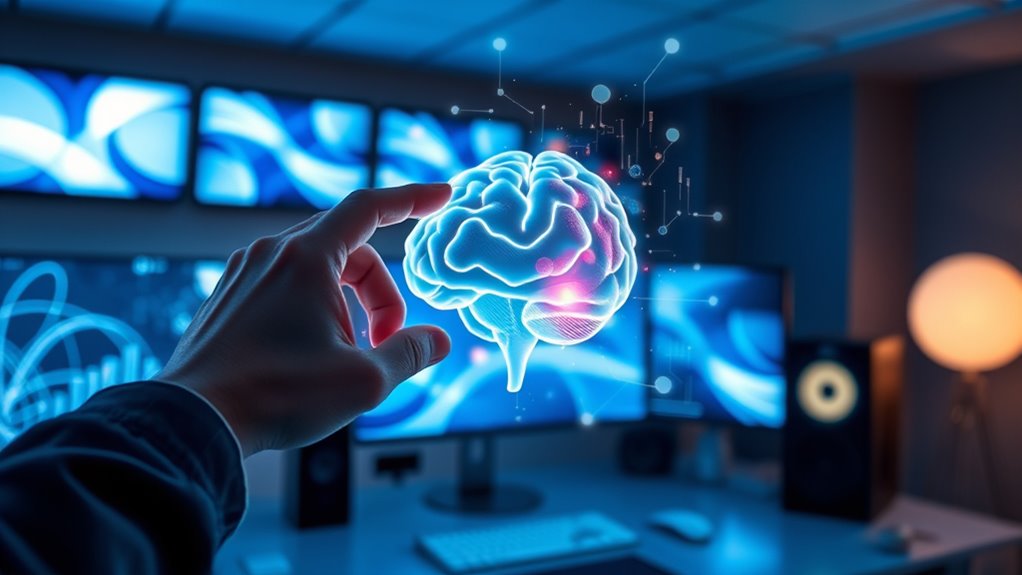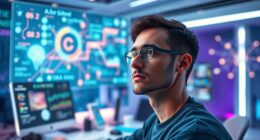You might notice that technology now instinctively predicts your needs, blending AI, apps, and gut feelings seamlessly. Advanced algorithms analyze your habits and preferences, often understanding you better than you realize. This digital intuition enhances your decision-making by offering personalized insights and suggestions, effectively becoming an extension of your natural instincts. As this integration deepens, your choices are guided by a smart collaboration between human intuition and machine intelligence—continue exploring, and you’ll uncover how this synergy shapes your daily life.
Key Takeaways
- AI systems develop digital intuition by analyzing vast data to predict user preferences and behaviors.
- Apps leverage machine learning to enhance decision-making, often aligning with or supplementing gut feelings.
- Digital intuition bridges human instincts and machine predictions, improving personalized experiences and choices.
- Users’ data inputs refine AI’s ability to anticipate needs, creating a symbiosis between natural judgment and technology.
- Recognizing this intersection helps harness AI’s predictive power while maintaining human intuition’s role.

In today’s rapidly evolving digital landscape, the line between human intuition and technological innovation is becoming increasingly blurred. You might not realize it, but machine learning algorithms are now shaping many of your daily decisions, often working behind the scenes to enhance your experiences. These systems analyze vast amounts of data to recognize patterns and predict outcomes, mimicking a form of digital intuition that rivals human instincts. Instead of relying solely on gut feelings, you’re increasingly trusting AI-driven apps that offer personalized recommendations, whether it’s selecting a playlist, choosing a route, or making financial decisions. This fusion of human intuition and machine learning creates a new type of understanding—digital intuition—that learns from your behaviors and adapts over time, making technology smarter and more responsive to your needs.
You might notice how these intelligent systems seem to anticipate your preferences, sometimes even before you consciously realize what you want. It’s not magic; it’s advanced algorithms trained on countless data points that allow machines to develop a kind of digital intuition. They don’t just react to your inputs—they predict future actions based on past patterns. This capability enhances your decision-making process, often leading you to solutions or options you hadn’t considered. In this way, technology is complementing your natural instincts, making your choices more informed and efficient. Additionally, the use of beneficial ingredients like collagen and hyaluronic acid in some systems can further support skin health, akin to eye patch benefits. But it also raises questions about how much you should rely on these systems—should you trust the AI’s “gut feelings,” or is there still value in your own intuition?
AI predicts your needs before you realize them, enhancing decisions but raising questions about trusting digital intuition over your own.
As AI continues to evolve, it’s becoming more integrated into your everyday life, blurring the boundaries between human instinct and machine intelligence. Apps now use machine learning to analyze your habits and offer insights that seem almost intuitive. For example, health apps monitor your activity and suggest adjustments based on patterns they’ve identified, mimicking a kind of digital intuition. It’s like having a digital confidant that understands your tendencies better than you might realize. This symbiosis of intuition and technology isn’t about replacing your instincts but augmenting them, giving you tools to make smarter choices faster.
In this ongoing intersection, your role is central. You provide the data, your behaviors feed the algorithms, and in return, you get tailored insights that feel intuitive. As machine learning models become more sophisticated, they’ll continue to refine this digital intuition, making technology an even more natural extension of your own instincts. Recognizing this dynamic can help you harness the power of AI without losing sight of your innate judgment, creating a seamless blend of human and machine intelligence that’s shaping the future of decision-making.
Frequently Asked Questions
How Does AI Interpret Human Intuition Differently Than Machines?
You wonder how AI interprets human intuition differently from machines. AI relies on neural processing and sensory integration to analyze data patterns, but it lacks the subconscious cues your brain picks up instantly. Your intuition combines past experiences, emotions, and sensory signals to guide decisions, while AI processes explicit data inputs without emotional context. This fundamental difference means AI can’t fully replicate the nuanced, holistic nature of human intuition.
Can Apps Reliably Replicate Gut Feelings in Decision-Making?
Imagine a lighthouse guiding ships through fog—apps try to do the same with gut feelings. While they can analyze data to mimic emotional accuracy, they often fall short of capturing subconscious cues that shape your instincts. Apps may offer insights, but they can’t reliably replicate the nuance of your intuition. Your gut’s subtle signals remain a complex, human experience technology still struggles to fully understand or reproduce.
What Are the Ethical Considerations of AI Influencing Intuition?
When AI influences your intuition, ethical concerns arise, especially around privacy and bias. You need to reflect on how your data is collected and used, ensuring your privacy is protected. Additionally, AI systems can embed biases, potentially skewing your decision-making. It’s vital to question whether technology supports fair, unbiased guidance or manipulates your gut feelings, emphasizing transparency and bias mitigation to maintain ethical integrity.
How Does Cultural Background Affect the Use of Intuition and Technology?
Think of your cultural background as a gentle guiding hand shaping how you blend tradition and innovation. It influences your trust in intuition versus technology, often colored by cultural biases. You might lean more on gut feelings rooted in tradition, or embrace new tools with open curiosity. Your cultural lens helps you navigate this balance, ensuring you respect your roots while exploring the possibilities that modern technology offers.
Are There Risks of Over-Relying on Technology for Intuitive Judgments?
You might face risks if you over-rely on technology for intuitive judgments. Tech dependency can lead to intuition erosion, making you less confident in your gut feelings. Relying too much on AI and apps may diminish your ability to make quick, instinctive decisions, potentially causing errors. To stay balanced, it is crucial to combine tech tools with your natural instincts, ensuring your judgment remains sharp and trustable.
Conclusion
So, here you are, relying on your gut while apps tell you what to think. Who needs intuition when algorithms can read your every move? Maybe your instincts are just outdated, like dial-up internet. But hey, maybe someday, your smartphone will finally tell you when to trust that weird feeling—until then, enjoy the delightful chaos of blending tech with your personal intuition. After all, what could possibly go wrong?









